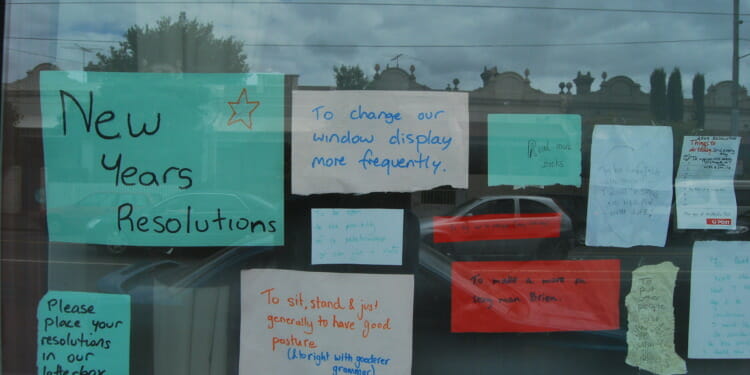Resolutions can be hard to stick to. We have all tried and failed to keep them over the years and some of us have given up entirely. Creating new habits or practices can be hard when you start from scratch. Often we are left feeling guilty when we don’t achieve the goals we have set for ourselves, which is why it is important to set realistic and achievable goals for our New Year’s resolutions.
The turn into a new year doesn’t have to be the only time to make resolutions, you can start them any time of year. While there are powerful psychological reasons for January being a good time to start, that doesn’t mean you can’t set goals in November or May.
Why are resolutions so hard to stick to?
When the new year rolls around often we find ourselves fantasizing about how we are going to be a completely different person after the clock strikes midnight. We are going to exercise more frequently, eat healthier, call our relatives, and be more patient when our roommate steals our cheese for the millionth time. Often these things are so hard to stick to because they are too far-fetched or vague. It is overwhelming to try and stick to a million things at once especially when you don’t have a plan.
Additionally, it’s important to remember that there are reasons you are not already doing the things you want to be doing. That isn’t to say it is impossible to start doing them, but if it were easy, you would likely be doing it already.
The acronym SMART is often used to help people plan their New Year’s resolutions, and it stands for Specific, Measurable, Achievable, Relevant, and Time-bound.
Start small
If your goal is to be waste-free by the end of the year, you might not start by trying to be waste-free now and hoping for the best. Try doing some research and seeing how to approach it.
You can set a smaller goal of minimizing your waste by a certain amount and then once you have that down you can set a bigger goal. If you want to spend more time in nature, maybe set a goal of going on a weekend excursion every few weeks depending on how accessible nature is to you.
Once you feel more confident in achieving the smaller goal, you have a better idea of what the next step would be to meet the bigger goal
Make a plan
Having a rough or concrete idea of a timeline will help you stay committed to your resolution. Often New Year’s resolutions slip away because they are entirely self-directed. Having a plan can keep you on track and give you a structured approach, even a loose one that can guide you to your goal.
Do some research
It is important to know what you’re getting into with your resolutions. If you want to live more sustainably, try and look online at forums or communities that live sustainably and learn their tips and tricks. Or check this out on Impakter: We recently published an informative series of articles written by a Polish filmmaker who decided to change the way she lived and adopted a minimalist lifestyle, trying to change her habits and reduce to a minimum plastic and other environmentally damaging products in her home.
Once you know the challenges others encountered and the mistakes they made you can avoid making those mistakes and have a smoother transition into adopting your resolutions.
Be accountable
Log your progress or have a buddy who has the same resolution or goal so you have someone who can keep you on track. Having a buddy or a thing you’re accountable to, even just your journal, can help you remember your goal and keep at it.
Create two versions of your resolution
If your resolution is to add something to your routine, for example going on a walk every day, it’s a good idea to have two versions of the walk. You can have a 45-minute walk on regular days, and on busy days you can have a 10 or 15-minute walk or even a 5-minute walk.
Having different versions of your goal in advance can help you avoid paralysis when you don’t have time, but still want to be consistent.
Plan to reevaluate if you are not meeting your goal
Sometimes things get in the way of resolutions and that is okay. There are things outside of your control that impact your life. If your goal was to bike more, and you find that you keep getting flat tires around your city that make you late to work, it might be time to rethink your goal. You could instead switch to public transport instead of a personal vehicle, or opt to work at home if that is an option.
The video below offers some good tips to be successful in the new year such as setting monthly goals, making goals more fun, and breaking down your goals into micro habits.
Resolutions are opportunities to feel good about yourself and to try new things. If your resolutions are making you feel bad, reevaluate. Create ones that you can stick to and that will make you feel good about yourself.
Editor’s Note: The opinions expressed here by Impakter.com columnists are their own, not those of Impakter.com. — Featured Photo: New Year’s Resolutions the Aussie way Photo Credit: Nicolas Boullosa Flickr














